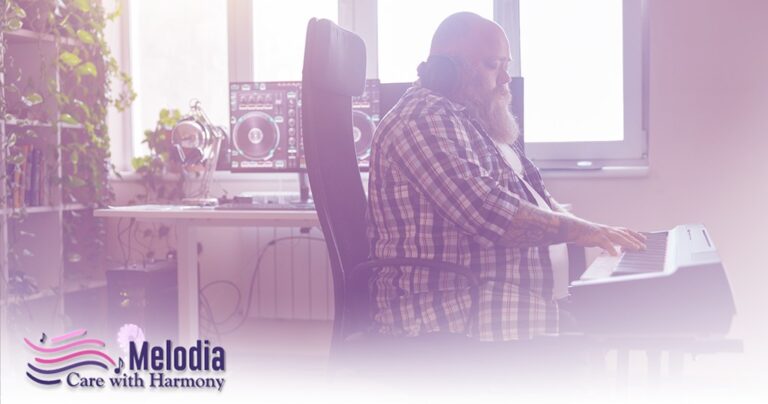Hospice Music Therapy In Los Banos, California
Music therapy can help patients who have run out of options for medical treatment by addressing the emotional, spiritual and bodily demands that may arise.
Listening to music, discussing lyrics, songwriting, improvising, singing and playing an instrument may all be part of a palliative care music therapy session. The individual’s musical, cultural and religious backgrounds may be brought into the session, creating a personalized approach. Respect for the patient’s demands and preferences is paramount in all cases.
Music therapy can act as a stimulus for terminally ill patients to create verbal and nonverbal contact. Music, when used appropriately, can allow emotional self-expression and provide a supportive, non-threatening setting conducive to confronting fears and discussing current difficulties. Musical associations can aid in the assessment of one’s life and the resolution of crucial personal concerns.
Music therapy has the potential to reduce feelings of loneliness and isolation by encouraging social interaction and the sharing of personal experiences. Religious music can bring spiritual comfort, reassurance and can help to strengthen an individual’s faith. Additionally, music therapy can assist family members in their mourning process by offering comfort, continuity and opportunities to express their feelings of loss.
Chemotherapy-induced nausea and vomiting and physical pain perception have both been demonstrated to be greatly reduced by listening to music. Carefully chosen music can promote relaxation and decrease symptoms of anxiety, agitation and sleeplessness. It can also serve as a catalyst for physical activity and increase emotions of well-being. By providing possibilities for choice and decision-making, music therapy can also assist the client in regaining a sense of independence and control over their life. Instruments and materials can be changed to maximize participant’s interest as well as participation throughout the session.
Individual or group music therapy sessions with family, friends or other patients are available. Sessions with portable instruments and sound equipment can also be delivered at the patient’s bedside. Depending on the patient’s needs and preferences as well as the techniques being employed, live or recorded music may be used during treatment sessions.
Music therapy is a critical component of care for hospice patients and bereaved families. A distinctive feature of Melodia Care Hospice is the presence of three board-certified music therapists on staff, all of whom are dedicated to serving patients and their families musically.
Music Therapy: What Is It?
It is a clinically sound and evidence-based healthcare technique that utilizes music to help individuals achieve their unique goals. Music therapists at Willamette Valley Hospice take into account patient’s musical choices as well as their cultural background and spiritual beliefs. They use this knowledge to provide compassionate care that alleviates distressing symptoms such as difficulty breathing and anxiety. Music therapists who have received formal training employ counseling strategies to provide vocal and musical support to patients and their families.
For instance, Greta was a hospice patient who required regular wound care from her caregiver. Greta despised the nurse who came to change the dressing on her wound because it was unpleasant. Her nurse requested assistance from a music therapist during dressing changes. The music therapist played specialized music throughout the wound care, which distracted Greta’s attention, activated the body’s natural painkillers in her brain and made the experience much more bearable for Greta
How Music Therapy May Benefits Patients & Families At Melodia Care Hospice?
Music has numerous effects on the mind, body and spirit. It can impact the body’s natural rhythms to manage blood pressure and breathing. It has been shown to increase the release of the body’s natural painkillers while decreasing anxiety and restlessness. Music is the heart’s and soul’s language. It enables us to express ourselves emotionally and spiritually and to discover a better sense of purpose in our life. In hospice and palliative care, music therapy is helpful in addressing the following issues:
- Anxiety and pain
- Concerns about one’s emotional and spiritual well-being
- Assisting bereaved families
- The requirement for meaningful engagement among family members
- The development of coping mechanisms
- The pursuit of meaning and the examination of one’s life
- Depression, fear, solitude, bewilderment and a sense of helplessness
- Life-quality
- Assisting in the facilitation of a peaceful death
What Types Of Music Therapy Treatments Does Melodia Care Hospice Provide To Its Patients?
Hospice patients can participate in individual and group family music therapy sessions. The duration and frequency of sessions are determined by the patient’s and family’s needs, goals and the therapies used.
Music Therapy group sessions are accessible to families that engage in Melodia Care Hospice’s bereavement programs, including grief support groups for families and children an annual summer camp for grieving children and families.
Who Is Eligible To Become A Music Therapist?
AMT- accredited music therapy degree programs are required for board certification (AMTA). In addition to academic requirements, the bachelor’s degree program includes 1200 hours of clinical supervision during an internship. Professional practice as a music therapist requires the designation MT-BC (Music Therapist–Board Certified), meaning graduates of this program will be eligible to appear for the national certification exam. Graduate degrees in music therapy have an emphasis on clinical practice and research with a wide range of patient populations. Music therapists who wish to maintain their certification are required to participate in regular hours of continuing education. Speak with us to learn more about this vital service.
Musical Therapy For Symptom Alleviation

This calming, non-invasive therapy establishes a physical and emotional connection that enhances one’s quality of life while relieving the following symptoms:
- Pain
- The distress of the respiratory system
- Depression
- Agitation
- Anxiety
Techniques Of Music Therapy

When music therapy is incorporated into the care plan, a music therapist analyzes your loved one and develops a customized program. Several strategies are employed during therapy sessions, including the following:
- Relaxation aided by music
- Movement
- Songwriting
- Singing beloved tunes with the accompaniment of a musical instrument
- Making a CD of family music
- A chance to express one’s emotions and recollections
Music therapy sessions can be a highly effective and pleasurable way to communicate with a loved one while exchanging feelings and memories. When communicating with loved ones who have memory loss, this method of communication is quite useful.
Music therapy is much more than just listening to music at a hospital or nursing home. The clinical and evidence-based use of music therapy is by a board-certified music therapist. Patient’s strengths and needs are evaluated and a treatment plan is developed including creating, singing, dancing to and listening to live, patient-preferred music during individual, group and family sessions.
Music may help people of all ages, backgrounds and abilities since it is non-threatening, pleasurable and promotes brain function. When delivered to hospice patients, music therapy can complement other therapeutic methods to address the physical, emotional, cognitive and social needs of persons who are dying. Despite the fact that music therapy is not appropriate for every hospice patient, it can be surprisingly beneficial when used on a largely unresponsive patient.
Who Is An Ideal Candidate For Hospice Music Therapy?

Patients who benefit the most from music therapy are those who:
- There is a shortage of social interaction and sensory stimulation.
- Suffer from chronic pain and symptoms that are difficult to manage with conventional medical interventions
- Feeling anxious or afflicted with dementia.
- Seek a concrete method of coping or of defining or articulating feelings or thoughts.
- Face communication difficulties as a result of physical or intellectual disabilities
- Spiritual assistance is required, which may involve other family members.
- Take pleasure in music to improve their quality of life or to maintain their dignity.
What Methods Are Employed In Music Therapy?

Many musical exercises and interventions are used by music therapists. Some examples include working together on songs as a means of helping patients express their emotions or helping patients improve fine motor skills and dealing with hidden emotions through the use of musical instruments.
Frequently Asked Questions (FAQs)
Is it necessary for the patient to have prior musical training for hospice music therapy to be effective?
They do not. Music therapy is recommended based on symptoms, patient/family interest and reaction to a music therapy assessment.
Is it necessary for the patient to be attentive and oriented to benefit from music therapy?
No. Music can elicit significant feelings and memories for confused patients, enhancing communication, mood and overall quality of life.
Will hospice music therapy aid patients who are only partially responsive?
Hearing is believed to be the final active sense to deteriorate before death. Music therapy may be beneficial for unresponsive people.
Should hospice music therapy be conducted in a private setting?
Occasionally, privacy may be required. However, family engagement is strongly encouraged to strengthen bonds amongst loved ones.
Can Music Therapy Be Beneficial To All Patients?
While music can be helpful for some people, it can exacerbate their agitation and anxiety in others. Not every patient or family member will find music therapy appealing. Music therapists are assessed regularly and will never continue therapy with a patient who has a harmful or dangerous response.
Melodia Care Hospices provide a variety of complementary therapy treatments to patients residing in the hospice and those visiting for the day. Learn about our hospice by contacting us today.
